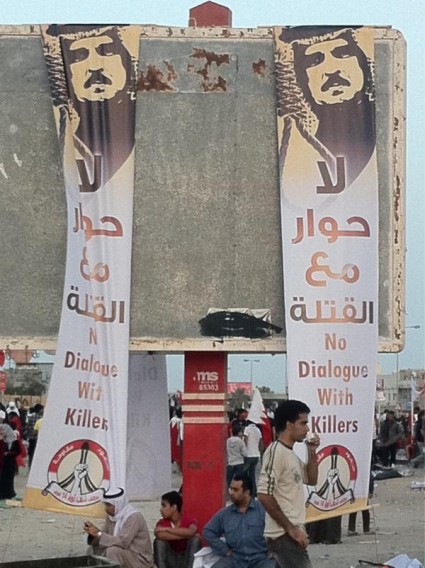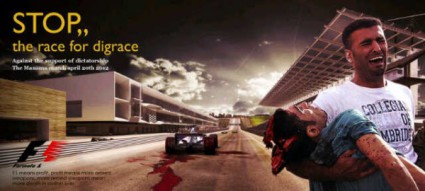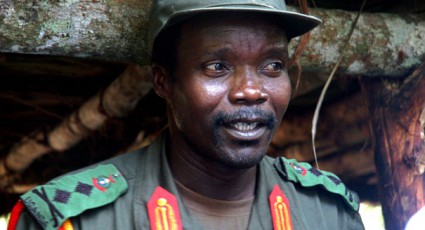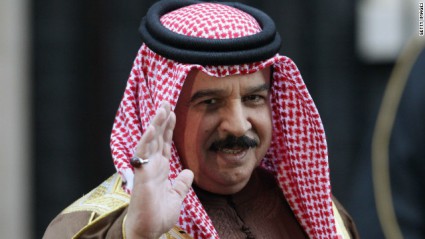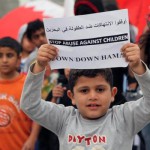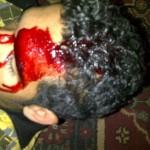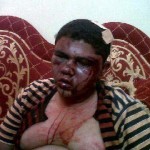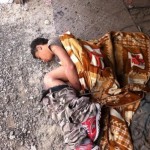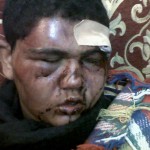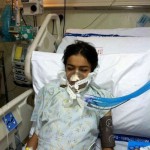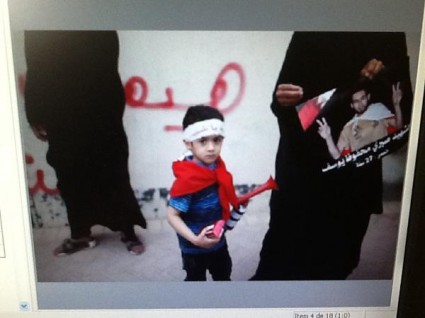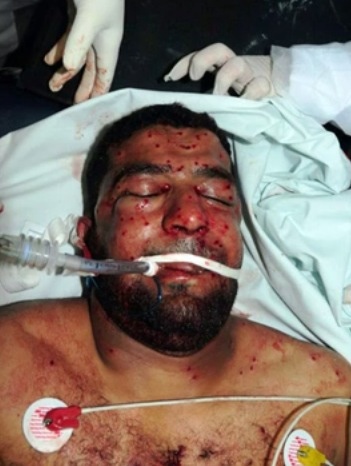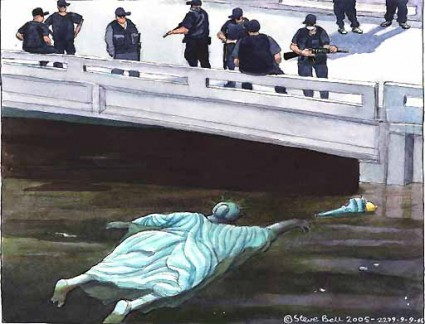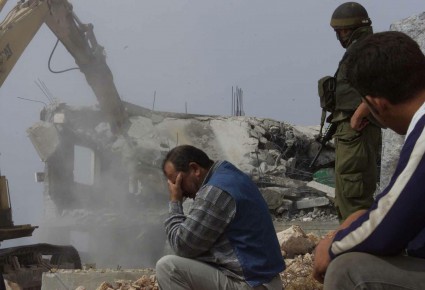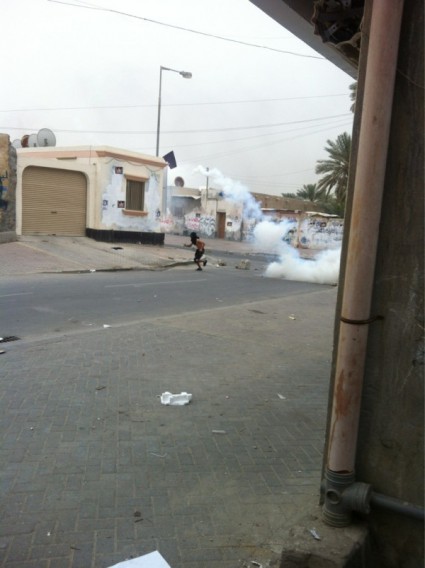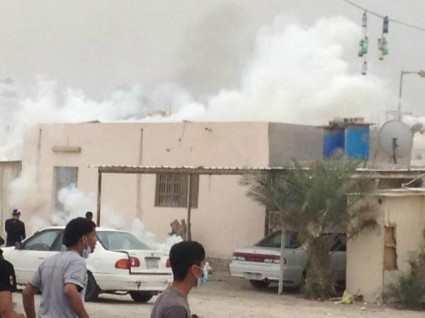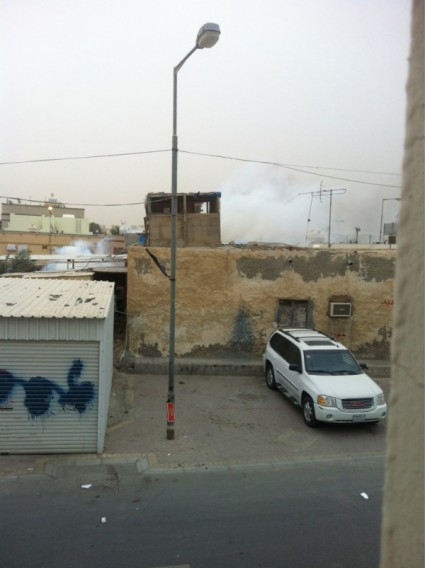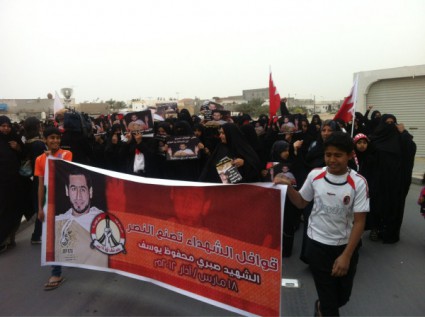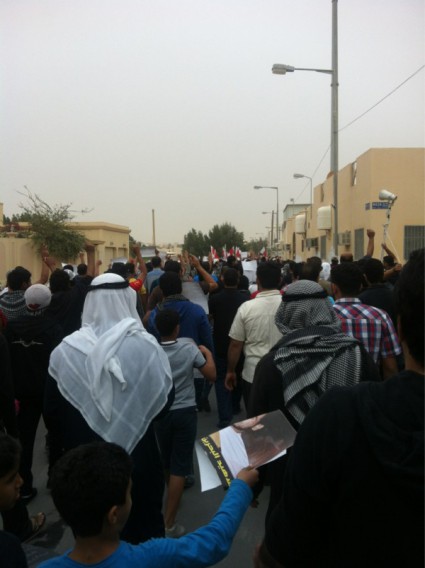No Dialogue with Killers
Saudi Arabia “reaching out to Bahrain opposition”
22 March, 2012 – World Bulletin
The leading Shi’ite opposition party Wefaq was involved in backroom talks during a pro-democracy uprising last year on reforms offered by Crown Prince Salman, but the they were cut short when Saudi troops rolled in and martial law was imposed.
Saudi Arabia wants Bahrain’s government and opposition to resolve a political crisis that it fears could worsen because of the sectarian fallout of fighting in Syria and destabilise its Eastern Province, a diplomat and opposition politician said.
Bahrain has been in turmoil since the Arab Spring protest movement first erupted a year ago. Clashes have become a daily occurrence, usually in districts populated by majority Shi’ite Muslims who have dominated the protests.
“We heard that at end of January the Saudis were reaching out to Wefaq and wanted to hear how Wefaq – if Act 1 was last year – how they were going to play their role in Act 2,” a senior Western diplomat said.
The leading Shi’ite opposition party Wefaq was involved in backroom talks during a pro-democracy uprising last year on reforms offered by Crown Prince Salman, but the they were cut short when Saudi troops rolled in and martial law was imposed.
The revolt was led by Shi’ite Muslim majority population on an island which is important to Washington as the base for the U.S. Navy’s Fifth Fleet.
The Shi’ite majority has called for sweeping democratic reforms that would reduce the Sunni ruling family’s monopoly on power and allow parliament real powers to legislate and form governments.
One year on clashes between riot police and youths in Shi’ite districts have escalated, with heavy use of petrol bombs against police who in turn use large amounts of tear gas. Activists say at least 32 have died since martial law ended, though police question the causes of death.
In January Wefaq members met with Royal Court Minister Khaled bin Ahmed for preliminary discussions on a formal dialogue on democratic reforms.
The diplomat said Wefaq, which faces radicalisation among many Shi’ite youth who oppose the monarchy, had met for a second time with the minister in recent weeks.
“There is stuff going on but it’s getting more difficult than they imagined it would be. They are finding it difficult to get common ground,” he said, citing government fears that Wefaq would command a parliamentary majority.
“You can foresee a political solution here that would keep the Saudis very happy, but I think the red lines would be slightly tighter than last year,” he added.
Analysts say Riyadh sent troops last year because of alarm that Bahrain had not contained protests that had the potential to spill over into the Shi’ite Eastern Province region, where major Saudi oilfields are located.
An opposition politician, who did not wish to be named, said Saudi Arabia now feared that the conflict in Syria could sharpen Bahrain’s sectarian divide – detracting attention from Syria and firing up Saudi Shi’ites.
“The Saudis are worried (the stalemate) could push the Shi’ites towards Iran… and at what could emerge as a consequence of Syria,” he said. …more
March 22, 2012 No Comments
Stop Bahrain’s F1 “Race of Disgrace” – Don’t Come
March 22, 2012 No Comments
Seamless Integration of Tyrany and Deceit – al Khalifa and al Saud
The opposition in Saudi Arabia is calling for democratic and social reforms – but the movement is ignored by the international media and Western governments.
Saudi Arabia: protests in the centre of counter revolution
22 March 2012 – by Joseph Daher – Counter Fire
Thousands of students at the all-female King Khaled University in Saudi Arabia boycotted classes last week to protest against poor services and demand reform. Following the suppression of the demonstrations, protests have spread to a number of cities in Saudi Arabia. The anger of students spread and gone beyond the city of Abha to larger parts of the Kingdom, where several protests took place in the cities of Riyadh, al-Namas, Ar’ar, Qatif and al-Rabeeah.
Saudi authorities responded to the protests with violence, killing one female student and injuring 54 others.
In Taibah University in the city of Medina, one student was expelled for publicly criticising the deteriorating conditions on campus during an open meeting with the director. In the eastern province of Qatif, one civilian was killed and several injured after security forces clashed with protesters demanding political reform.
The Ministry of Interior released a statement in which it vowed to address ‘acts of terrorism’ and described the protesters as ‘a deluded minority.’
Protests started with the self-immolation of a man in Samtah, Jizan, on 21 January 2011 and demonstrations of a few hundred people in late January in Jeddah and throughout February and early March in the cities of Qatif, al-Awamiyah, Riyadh and Hofuf.
In April 2011, several small protests over labour rights took place in front of government ministry buildings in Riyadh,Ta’if and Tabuk. Protests continued in late March and April in Qatif and smaller cities in the Eastern Province such as al-Awamiyah, and Hofuf, which are majority composed of Saudi Shia citizens who are discriminated by the authorities because of their religion.
The protestors called for the release of prisoners, the withdrawal of the Peninsula Shield Force from Bahrain and equal representation.
Uprisings have continued in the Qatif region. During protests in May, October and November, police shot live ammunition at protestors calling for the Eastern Province to have its own constitution and legislative assembly, and for the Society for Development and Change to be legally registered. The protests continued in December in Riyadh and Buraidah, calling for the release or trial of prisoners. …more
March 22, 2012 No Comments
King Hamad’s Apartheid in Bahrain
March 22, 2012 No Comments
STOP BAHRAIN CHILD ABUSE AND MURDER – STOP KING HAMAD
US CONGRESS VOTED NOT TO LET JOHN KONY GET AWAY WITH CHILD ABUSE AND MURDER
BUT THE US CONGRESS WON’T STOP KING HAMAD AND PRESIDENT OBAMA CALLS HIM FRIEND
NO MORE VICTIMS – HAMAD MUST GO – INSIST UPON IT
March 22, 2012 No Comments
Hope lights the path of the Revolution
March 22, 2012 No Comments
Ali Hashem Al Jazeera Journalist Explains Resignation over Syria and Bahrain Coverage
Al Jazeera Journalist Resigns over Syria and Bahrain Coverage
by grtv
Ali Hashem: Al Jazeera has become a “media war machine” and is “committing journalistic suicide”.
In the middle of February, something called the Syrian Electronic Army—hackers in Syria that support the government—hacked into Al Jazeera’s servers and found some emails. Some of them were written by Ali Hashem, who was a Middle East correspondent for the Arab Al Jazeera channel. In those emails he expressed his concern about the way Al Jazeera was covering the conflict in Syria. It later led to his resignation.
Ali Hashem is a television journalist who recently resigned from his post as a war reporter for Al Jazeera. While working for Al Jazeera, he covered the revolution in Libya, Lebanese politics, and tension related to the Syrian uprising on the Syrian Lebanese borders. He also worked for the BBC and led the production team at Manar TV. …source
March 22, 2012 No Comments
King Hamad Free Jafer Salman Maki Now!
Jafer lost one of his eyes due to a birdshot and he’s about to lose his second eye of not treated ASAP. #FreeJafer #bahrain
March 22, 2012 No Comments
Bahrain “Police Cameras” – no matter Police impunity is justice dead
Bahrain police install cameras to curb abuse
By Andrew Hammond – 22 March, 2012 – Reuters
MANAMA (Reuters) – Bahrain is installing video cameras in police stations to try to clean up its human rights image after crushing a pro-democracy uprising last year, but activists say off-camera abuse continues in other locations.
At al-Hoora station in Manama, closed circuit television will record police interrogations in rooms with padded grey walls. Rooms without cameras are set aside for detainees to consult lawyers. Other areas of the station are also monitored.
“We chose the color grey because it’s an international standard and it calms people. Anyone in a state of violence has to be calmed down,” said Brigadier Mansour Alhajeri, a police officer conducting a tour for journalists.
He said seven other stations were now being fitted with the monitoring system and all 33 stations would be covered by October.
But the cameras, introduced after an inquiry led by international jurists uncovered five deaths under torture last year, will not be installed in at least five riot police bases where activists say youths have been beaten.
“They don’t detain anyone, any arrests will be handed over to police,” police chief Tareq al-Hassan said when about the absence of cameras in the bases from where riot police using jeeps and armored vehicles move to handle protests.
The United States, which sees Bahrain as an ally in its conflict with Iran, has held up arms sales, including anti-tank missiles and armored humvees, until the Gulf island state shows progress in implementing human rights reforms.
Bahrain has been in turmoil for over a year as opposition parties dominated by the Shi’ite majority population demand an end to the Al Khalifa family’s hold on power and Shi’ite youths clash daily with Sunni-dominated riot police, many of them foreign hires.
Banking, tourism and real estate have slowed as the unrest scares off investors and strains the economy, while the clashes have intensified in the past three months.
Police say they show restraint in the face of rioters who attack them with petrol bombs and iron bars, damaging vehicles and wounding personnel.
But opposition and rights activists say 32 civilians have died since June, many from the effects of tear gas or direct hits by tear gas canisters and sound bombs.
The government questions the causes of death and their attribution to the political conflict.
The U.N. High Commission on Human Rights said this week it was concerned about a disproportionate use of force and excessive use of tear gas and would investigate the death toll.
OFF-CAMERA BEATINGS?
Bahraini rights activists list three informal detention centers where Shi’ite youths are beaten up by riot police before release, while others are beaten in the street.
“More than 160 people have been beaten in these places,” said Mohammed al-Maskati, head of the Bahrain Youth Society for Human Rights, naming one site as a youth hostel in Sanabis which police acknowledge has been transformed into a riot police base.
Maskati said abuse had moved out of the range of cameras.
“In the past four months I never heard of anyone abused in a police station. They are hit before they reach there, that is the technique they use now,” he said, citing 10 teenagers mistreated in an unused building in Dar al-Kulaib this week.
A 16-year-old was abducted on Wednesday in Sanabis and found unconscious several hours later with his hands tied, underpants removed and trousers pulled down. His family filed a complaint to public prosecutors, blaming plainclothes detectives.
The interior ministry said it was investigating the incident.
John Timoney, a former Miami police chief hired to advise on the reforms, acknowledged that monitoring of detainees before they arrive in police stations was a relevant concern.
“If an arrest is effected, they should be taken to the nearest police station in that area. I take your point – police officers are directed to take them to the nearest police station,” he said when questioned at a news conference.
He added: “If anybody has any information on secret locations of that nature, we want to hear it.” …source
March 22, 2012 No Comments
Bahrain Medics Show Trial: This Is Not Syria, Therefore No Western Outcry
Historically, to maintain this excruciating state of inequality, the Bahraini rulers developed a system of governance and state security apparatus that is “bullet-proof to reform”. Under American and British tutelage, the Bahraini rulers became adept at presenting the kingdom as a relatively benign monarchy. They may have acquired the modern semantics and appearance of political progressivism, such as referring to the kingdom as a constitutional monarchy with a (rigged) parliament instead of an absolute monarchy as in neighbouring Saudi Arabia and the other Gulf sheikhdoms. But not far below the surface, Bahrain’s institutionalized despotism was always the dominant reality.
Bahrain Medics Show Trial: This Is Not Syria, Therefore No Western Outcry
by Finian Cunningham – Global Research – 22 March, 2012
Bahrain’s disgraceful show trial of medical staff is set to continue, with news this week that 20 doctors and nurses are to be retried in a civilian court on trumped-up charges of subversion against the US-backed regime.
The medics were already sentenced by a military tribunal (a military tribunal!) to up to 15 years in prison after months of being held in illegal detention, denied legal counsel and subjected to torture.
Moving their case to a civilian court is presumably meant to signal a concession by the regime. But what it illustrates is that the Al Khalifa royal rulers of Bahrain are unreconstructed despots who are implacably set against accepting any kind of democratic reform.
The persecution of the majority Shia population – 70 per cent of the island – by an unelected Sunni elite is business as usual as epitomized by the vindictive targeting of medics whose only “crime” was that they treated hundreds of people injured in the state’s brutal crackdown against the pro-democracy movement.
Recently, Washington has been doing its PR best to present the monarchy in the Persian Gulf kingdom as being belatedly open to reform – this after a year of unrelenting repression against a largely peaceful pro-democracy uprising.
Bahraini grassroots activists are concerned that sections of the official opposition belonging to the Shia Al Wefaq political society are being groomed by the US State Department to accept a “compromise deal” with the royal rulers that would effectively see the monarchy remaining in power and the status quo merely being given a facelift.
King Hamad bin Isa Al Khalifa has been praised in the US corporate media for overseeing “brave” moves towards political power-sharing and dialogue with the mainly Shia-led opposition.
Washington’s envoy on human rights Michael Posner and former national security advisor Elliott Abrams have talked up “important steps” by the Bahraini regime towards reform.
However, no amount of Washington spinning can conceal the facts of life: that the US-backed Bahraini regime will continue violating human rights and international law in order to maintain its stranglehold hold on political and economic power at the expense of the Shia majority.
For 280 years, the Sunni rulers, who invaded the country from neighbouring Qatar, have sat on the chests of the indigenous Shia, and they are not going to give up their privileged seats of comfort. The Al Khalifa dynasty has enriched itself through graft and corruption while the majority of Bahrainis struggle with unemployment and poverty. …more
March 22, 2012 No Comments
Interview with Bahrain’s Coalition of February 14th Youth
Bahrain’s Revolutionaries Speak: An Exclusive Interview with Bahrain’s Coalition of February 14th Youth
by Toby C. Jones – 22 March, 2012 – Jadahliyya
In spite of claims that Bahrain’s revolution has failed, the reality is that peaceful protests, a campaign of civil disobedience, and anti-Al Khalifa energy is at an all-time high. The regime’s reliance on heavy-handed violence has failed to quell the country’s revolutionary spirit or stamp out the opposition. If anything, the yearlong brutal siege against its own citizens has strengthened the resolve of anti-regime critics and their determination to carry on. Among the most determined to keep the revolution alive is the Coalition of February 14th Youth, an anonymous and decentralized political network that has coordinated months of activism and protest. While Bahrain’s older and more visible political societies, including al-Wefaq and Wa’ad, have sought and failed to negotiate with the government over the last year, the Coalition of February 14th Youth has steadily earned popular legitimacy for its commitment to revolutionary principles and action. Out of fear of arrest, the Coalition has coordinated its efforts primarily through social media, most notably on Twitter and Facebook. Until now they have cautiously avoided speaking directly with the media.
Toby C. Jones (TJ): How would you describe the February 14 Youth Coalition? Who is represented in the coalition? How representative is it?
Coalition of February 14 Youth (CFY): February 14 Youth are all those revolutionaries that stood firm on the streets ever since they lit the spark of a popular revolution on 14 February 2011. The coalition is merely a byproduct of this revolution and was formed out of a few of its active revolutionary groups. The February 14 Coalition derives its legitimacy from the popularity of the revolution and its goals.
TJ: What is the coalition’s relationship with the other opposition movements, most notably Al-Wefaq?
CFY: The coalition’s relationship with other opposition groups is based on the principle of respect and considers them integral in the struggle. It values all efforts that are made by them to protect the rights of the people including their right to self-determination as legislated in international law and conventions.
TJ: What is your relationship with non-registered opposition movements such as Haq, Al-Wafa, the Bahrain Freedom Movement, and others?
CFY: Our objective in the coalition with regards to all other opposition groups is to deal with them positively in a manner that serves the revolution and its goals, taking advantage of all expertise and opinions, while emphasizing the need to close ranks amongst revolutionary groups against the common enemy, the bloody Al-Khalifa regime.
TJ: What are the coalition’s objectives? Is the coalition committed to the fall of the Al-Khalifa or is there the possibility of a negotiated resolution with the regime?
CFY: The first and foremost goal that revolutionaries are struggling for is the liberation of our land from Saudi occupation and the overthrow of the Al-Khalifa regime, which has lost its popular and constitutional legitimacy. Once that is achieved, the people can choose their own destiny and choose the political and economic system that meets their ambitions and aspirations. We will not under any circumstance accept a compromise with this bloody regime that continues to violate our human rights. We are determined to liberate our precious homeland from dictatorship, and build a nation of justice, dignity, and equality for all its citizens. …more
March 22, 2012 No Comments
The “lovely, gentle, and beautiful Israeli occupation
Public radio station fires editor who dared to speak out about Israel’s ‘brutal military occupation’
by Philip Weiss – 22 March 22, 2012 – Mondoweiss News
Ugly news about the American discourse, and the role of the Israel lobby inside liberal institutions. A longtime editor at a public radio station in Baltimore has been fired in part because he questioned US pandering to Israel. David Zurawik reports in the Baltimore Sun:
Sunni Khalid, managing news editor at WYPR-FM, has been dropped by the public radio station after more than nine years on the job there.
Khalid, a former Baltimore Sun reporter, had been on probation in February for comments he posted on the Facebook page of a friend questioning the influence of Israel on American politics.
“I, for one, have had enough of this pandering before the Israeli regime,” he wrote. “The war-mongering toward Iran has, once again, distracted the world from Israel’s brutal military occupation of the West Bank, East Jerusalem and the Golan Heights.”
March 22, 2012 No Comments
Syria, Bahrain: A Tale of Two Uprisings… One Fabricated, the Other Forgotten
Syria, Bahrain: A Tale of Two Uprisings… One Fabricated, the Other Forgotten
by Finian Cunningham – Global Research – 19 March, 2012
The violent turmoil in Syria and Bahrain over the past year, taken together, provides a sharp comparative case study of the deception and hypocrisy of Western governments and the mainstream media.
It also points up the nefarious role of the pro-Western Arab states, in particular the Persian Gulf monarchies headed by Saudi Arabia.
Last week marked an exact anniversary for Syria and Bahrain. On the 15 March 2011, Syria saw the beginning of an armed insurgency described as “anti-government protests” in the Southern city of Daraa, on the border with Jordan. While the state forces of President Bashar Al Assad responded ruthlessly, from the outset it was clear that the anti-government “protesters” were heavily armed and well organised.
The events in Syria mirrored those in Libya, where opposition groups were also heavily armed and ready to use violence from the outset. In both Syria and Libya, the apparent protests were distinctly different from those seen in most other Arab countries, such as Tunisia, Egypt, Jordan, Yemen and Bahrain, where there was a groundswell of popular opposition to the incumbent Western-backed regimes and where dissent was largely peaceful.
This key difference can be explained because Western powers and their proxies, such as Israel, Turkey and the Gulf Arab states, were instrumental in arming and directing the supposed anti-government opposition in both Syria and Libya.
Special forces from NATO powers Britain and France were, tellingly, active on the ground from the get-go, lending their expertise in techniques of sabotage and terrorism.
Saudi Arabia and Qatar in particular were also instrumental in driving events in Syria and Libya, providing financial support, weapons, covert fighters and strident diplomatic backing for the self-styled “transitional councils”. In the instance of Libya, NATO’s involvement was scaled up to a full-blown aerial bombing campaign to assist the so-called rebels on the ground. Such overt NATO aggression has not yet transpired in the case of Syria, but it is a contingency that Western governments are only shying away from for now out of political calculation.
To get back to Syria’s comparative twin in this case study, Bahrain, the Persian Gulf kingdom also saw an upsurge in violence on the 15 March 2011 – but for markedly different reasons. In the month prior to that date, Bahrain had witnessed a truly mass uprising against the Al Khalifa monarchy.
Peaceful demonstrations in the capital, Manama, drew crowds of up to 300,000 – nearly half the indigenous population of the tiny oil-rich kingdom. The protest movement against the US-backed autocratic Sunni rulers had set up a permanent peace camp near the financial district of the capital. After four weeks of peaceful rallies calling for the downfall of the monarchy, the Bahraini uprising was ruthlessly attacked by the combined state forces of Bahrain, Saudi Arabia, Qatar and the other members of the so-called Gulf Peninsula Shield Force which had crossed the King Fahd Causeway linking Saudi Arabia and Bahrain. The military invasion to crush a civilian pro-democracy movement – one that was merely calling for an elected government to replace the decades-long dictatorship of the Al Khalifa dynasty – was given the green light by both Washington and London. . …more
March 22, 2012 No Comments
Funeral in Sanabis for Gassing victim while Gas rains down on Shahrakan
March 22, 2012 No Comments
Funeral Rally for Martyr, 27 Year Old Sabry Mahfood – Death by MOI Gassing
March 22, 2012 No Comments

